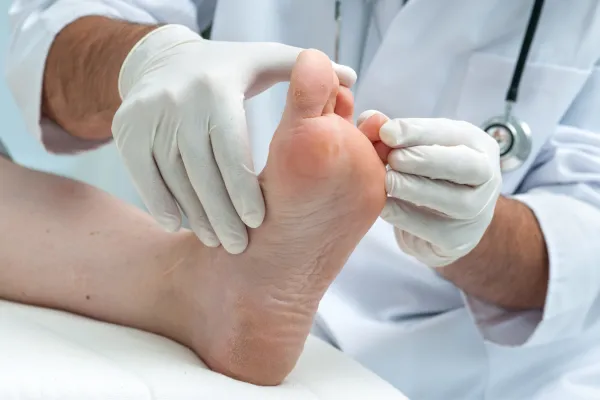
The Best Ways to Treat and Prevent Athlete’s Foot
It starts with a little itch. Maybe some peeling skin. Nothing major, right? But before you know it, that mild annoyance turns into full-blown redness, burning, and cracking between your toes. Welcome to the world of athlete’s foot—a common fungal infection that’s as frustrating as it is uncomfortable.
At Peak Podiatry, we see cases of athlete’s foot all the time, and trust us—you’re not alone. The good news? With the right treatment and prevention strategies, you can stop athlete’s foot in its tracks and keep your feet healthy, clean, and itch-free.
What Is Athlete’s Foot?
Athlete’s foot (also known as tinea pedis) is a fungal infection that usually starts between the toes. It thrives in warm, moist environments—like sweaty socks, damp shoes, and communal showers. Despite the name, you don’t need to be an athlete to get it. Anyone can be affected.
The infection is caused by dermatophytes, fungi that love feeding on dead skin. Once they find a nice cosy environment on your foot, they spread quickly and can be tough to shake if not treated properly.
Common Symptoms of Athlete’s Foot
Symptoms can vary from person to person, but the most common signs include:
Itching or burning between the toes
Redness and peeling skin, especially on the soles
Cracked or blistered skin
Dry, scaly patches
Unpleasant odour
It may seem like just dry skin at first, but left untreated, athlete’s foot can worsen—and even spread to your toenails or hands.
How to Treat Athlete’s Foot
1. Antifungal Creams and Sprays
Most mild cases can be treated with over-the-counter antifungal treatments, such as creams, powders, or sprays. Look for ingredients like clotrimazole, terbinafine, or miconazole.
Apply as directed, usually twice daily, and continue even after symptoms disappear to make sure the fungus is completely gone.
2. Keep Feet Clean and Dry
Fungi thrive in moisture, so keeping your feet clean and dry is key. Wash daily with warm water and gentle soap, and dry thoroughly—especially between the toes.
3. Change Your Socks Regularly
Wearing clean, dry socks every day (and more often if you’re sweating) helps prevent the moist environment fungi love. Go for breathable, moisture-wicking fabrics like cotton or merino wool.
4. Air Out Your Shoes
Don’t wear the same shoes two days in a row. Let them air out and dry completely, and consider using an antifungal foot powder or shoe spray to kill any lingering spores.
5. See a Podiatrist if It Doesn’t Clear Up
If your symptoms persist after a couple of weeks, or if the infection spreads to your toenails, it’s time to seek help. At Peak Podiatry, we can provide stronger prescription treatments and assess any underlying issues contributing to the infection.
How to Prevent Athlete’s Foot
Prevention is always better than cure. Here’s how to lower your risk of athlete’s foot in the first place:
1. Wear Flip-Flops in Communal Areas
Gyms, swimming pools, and shared showers are breeding grounds for fungal infections. Always wear shower shoes or flip-flops to protect your feet.
2. Keep Toenails Trimmed and Clean
Fungi love hiding under long or dirty toenails. Keep them short, clean, and dry.
3. Don’t Share Footwear or Towels
Athlete’s foot is contagious. Avoid sharing shoes, socks, or towels with others, even family members.
4. Use Antifungal Powder as a Preventative
If you’re prone to sweating or have had athlete’s foot before, a daily antifungal foot powder can help keep the infection at bay.
5. Rotate Your Shoes
Give each pair of shoes time to dry out between wears. If your shoes feel damp, pop in a pair of antifungal shoe inserts or use a UV shoe dryer.
Final Thoughts
Athlete’s foot is uncomfortable, frustrating, and far too common—but it’s also entirely treatable and preventable.
With a little consistency and the right care, you can stay one step ahead of the fungus. If you’re dealing with stubborn symptoms or have concerns about your foot health, don’t wait. At Peak Podiatry, we’re here to help with expert guidance, treatments, and tailored care.
Book an appointment today and get back to walking comfortably—itch-free and confident.
Peak Podiatry Clinic
Trusted Foot Care in Galway
Ask Robert And His Team
Fill in the form to request a Call From Our Team
Fill in the form to request a Call From Our Team
One of our team will call you for FREE and answer any questions or concerns you may have about your Foot Pain.
One of our team will call you for FREE and answer any questions or concerns you may have about your Foot Pain.
© Copyright 2022. Peak Podiatry All rights reserved.





